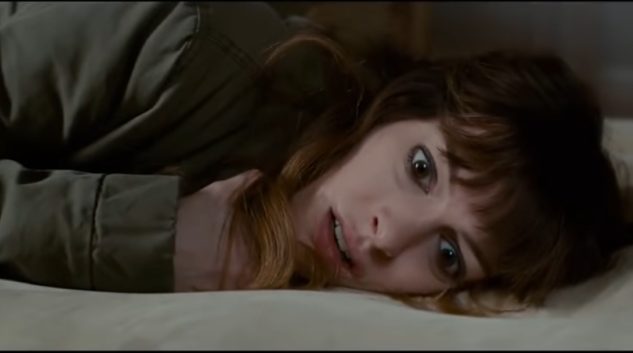Colossal

My biggest concern walking into Colossal was whether Nacho Vigalondo—the promising Spanish director of low budget but imaginative science fiction films such as Timecrimes and Extraterrestrial—would be stifled by the prospect of what is presumably the largest budget and most significant cast of his film career. Duncan Jones, after all, found a way to work the iconoclastic, hard sci-fi spirit of Moon into his first wide-release film, Source Code, before being hamstrung by studio demands in the would-be blockbuster trappings of Warcraft. It would be a great shame if Vigalondo were to suffer the same fate.
Thankfully, this is not the case. What Nacho Vigalondo has created in Colossal is a truly unusual, sometimes head-scratching aberration, a film with tonal shifts so jarring that the audience’s definition of its genre is likely to change repeatedly in the course of watching it. Aspects of the film defy explanation, but one thing is clear: Nobody was stifling the writer-director, and we’ve been given one of the most interesting films of 2017 so far. Vigalondo takes aim at the cliches of film festival dramas before smashing them under a giant, monstrous foot.
Gloria (Anne Hathaway) is a mess. She’s a 30-something “writer” of the sort one sees in film and nowhere else—the kind who never does any writing, but simply mentions occasionally that they’re “a writer,” while the other characters all inform the audience of the writer’s Very Important Perspective. She lives with her boyfriend Tim (Dan Stevens, of TV’s Legion), but rarely sees him because of more pressing, booze-related matters, which leads to him suggesting they spend time apart. In doing so, one must note that Hathaway makes for one of screendom’s least convincing binge-drinkers here, largely given the fact that the film seemingly goes out of its way to never depict her as anything but radiant and perfectly coifed. One wonders if she recently looked back on Rachel Getting Married and thought, “Alright, I’m not getting that messed up playing an addict again.”
Regardless, after being thrown out Gloria pulls a Greta Gerwig-style “getting my life together” decision and moves into her old family home in the sticks, now emptied out for reasons that are never entirely explained. There, she runs into childhood friend Oscar (Jason Sudeikis), who has apparently been carrying a torch for her and following her career as a nothing-writer with great interest. He owns a bar, where Gloria begins to work in a particularly ill-advised move, as this puts her into constant contact with both alcohol and his drunk friends Joel (Austin Stowell) and Garth (Tim Blake Nelson, sadly wasted).
If that description so far sounds like an indie dramedy—sort of a Silver Linings Playbook with more booze and less dancing—then you’re right, because it functionally is for the first 20 minutes. But as you know if you’ve seen any of Colossal’s trailers, there’s also a much more colorful wrinkle. When a giant monster appears in Seoul, South Korea shortly after Gloria’s arrival in her hometown, she soon becomes aware that her own actions—her actual, physical movements in a specific area of town—are directly linked to the creature. So it’s more like Godzilla meets Being John Malkovich.
Oh, and she’s also directly responsible for hundreds or thousands of deaths. Did we mention that?
-

-

-

-

-

-

-

-

-

-

-

-

-

-

-

-

-

-

-

-

-

-

-

-

-

-

-

-

-

-

-

-

-

-

-

-

-

-

-

-








































